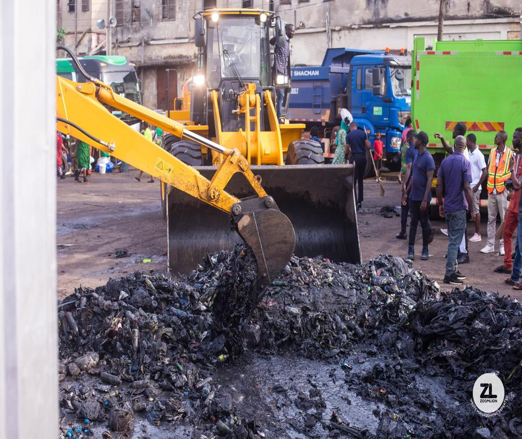By Gloria Boamah KUSI (Dr) & Ing. Glenn GYIMAH (Rev, Ph.D), Green Transition Limited
The global waste crisis is one of the most pressing environmental challenges of the 21st century.
With over two billion tonnes of municipal solid waste (MSW) generated annually worldwide, and projections indicating a rise to 3.4 billion tonnes by 2050, the scale and urgency of this issue cannot be overstated.
Alarmingly, at least 33 percent of global waste is not managed in an environmentally safe manner, resulting in significant health and ecological hazards.
In Africa, where urbanization is accelerating, over 125 million tonnes of waste are generated annually. Yet, less than 55 percent is collected, and under 10 percent is recycled.
The rest is either openly dumped or burned, leading to widespread pollution and the release of greenhouse gases (GHGs).
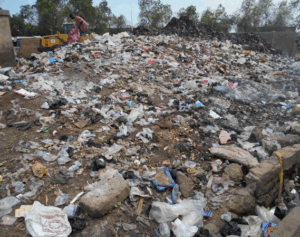
Methane, predominantly emitted from decomposing organic matter in landfills, and nitrous oxide from untreated wastewater are potent climate forcers.
Methane alone has a global warming potential 25 times greater than carbon dioxide over a 100-year period, making the waste sector a major driver of climate change. Globally, waste contributes approximately 3 to 5 percent of GHG emissions.
The implications of this are profound for Africa, where the convergence of poor waste management and increasing climate vulnerability amplifies the impacts of flooding, disease outbreaks, and water pollution.
Addressing the waste crisis not only provides a solution to environmental degradation but also offers an opportunity to mitigate climate change, especially in low- and middle-income countries such as Ghana.

Ghana exemplifies the challenges faced by many developing countries in managing both solid and liquid waste.
The country’s urban areas, particularly Accra, Kumasi, and Takoradi, have experienced rapid population growth and industrialization, outpacing the development of adequate waste management infrastructure.
As a result, the waste management system has long relied on inefficient and environmentally detrimental practices, such as open dumping and uncontrolled landfilling.
These practices have led to the accumulation of organic waste in landfills, where it decomposes anaerobically, releasing methane and nitrous oxide into the atmosphere.
Plastic waste, another major concern, clogs drainage systems, contaminates water bodies, and worsens urban flooding, particularly during Ghana’s rainy seasons. Inefficiencies in solid waste collection and disposal are mirrored in the liquid waste sector.
For many years, Accra’s Lavender Hill became synonymous with the indiscriminate dumping of raw sewage into the Atlantic Ocean. Hundreds of trucks offloaded untreated faecal sludge daily, contributing to severe marine pollution and posing substantial health risks to coastal communities.
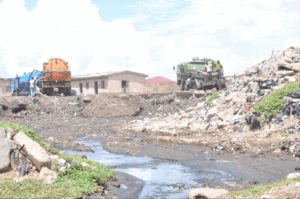
The absence of centralized sewage systems in most urban areas has meant that only a small proportion of wastewater is treated.
The remainder finds its way into rivers, lagoons, and groundwater, causing water pollution and increasing the incidence of waterborne diseases such as cholera and typhoid fever.
The public health and environmental implications of such practices are extensive, ranging from ecological degradation to increased health expenditures and reduced productivity.
Furthermore, the global and local climate impacts of waste mismanagement exacerbate Ghana’s vulnerability to climate change, particularly in areas prone to flooding and other extreme weather events.
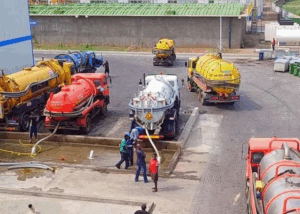
According to Ghana’s Fourth National Greenhouse Gas Inventory Report, the waste sector is responsible for approximately 12 percent of the country’s total GHG emissions.
These emissions primarily stem from the anaerobic decomposition of organic waste in landfills and the lack of effective treatment of liquid waste.
Despite its significant contribution to emissions, the waste sector has historically received limited attention in national climate strategies.
However, this is beginning to change with the growing recognition that sustainable waste management offers an untapped opportunity for emissions reduction, job creation, and climate resilience.
Ghana’s Nationally Determined Contributions (NDCs) under the Paris Agreement include waste management as a key intervention area. The country has committed to reducing emissions by 64 million tonnes of CO2 equivalent by 2030, with 24 million tonnes as an unconditional target.
Achieving this ambitious goal requires innovative approaches and strong public-private partnerships that leverage technological solutions, financial resources, and community engagement. In this context, the role of private sector actors, particularly those leading in waste management, becomes crucial.
An integrated approach to waste management is essential to address the dual challenges of environmental degradation and climate change.
Leading companies in Ghana have developed a comprehensive waste management framework that spans the entire waste lifecycle—from collection and sorting to recycling, composting, and treatment of both solid and liquid waste.
Through sustained investments in infrastructure, innovation, and climate finance, waste can be transformed from a liability into a resource, benefiting both the environment and local communities.
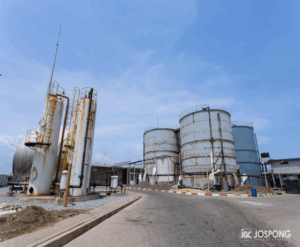
Waste treatment facilities, strategically located across Ghana, ensure broad coverage and operational efficiency.
These facilities include Integrated Recycling and Compost Plants (IRECOPs), the Accra Compost and Recycling Plant (ACARP), the Kumasi Compost and Recycling Plant (KCARP), and various medical and liquid waste treatment plants.
The integrated design of these facilities allows for the simultaneous processing of waste and the recovery of valuable resources such as plastics, metals, and organic matter.
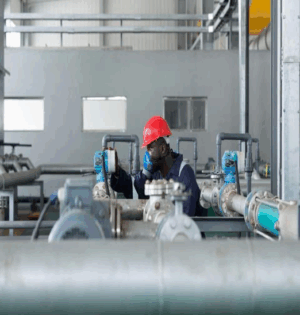
By diverting organic waste from landfills to composting plants, these systems minimize methane emissions and support sustainable agriculture through the production of organic fertilizers. Improved waste segregation at the source enhances recycling rates and reduces the volume of residual waste destined for final disposal.
These waste management strategies align with Ghana’s climate action plan, contributing directly to emissions reduction in the waste sector and supporting sustainable development.
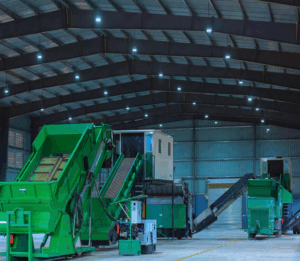
Beyond operational improvements, innovative approaches to climate finance and carbon markets are key to the successful integration of waste management with climate goals.
By engaging in carbon credit projects, Ghana is positioning itself at the forefront of climate finance, demonstrating the potential for waste management to play a pivotal role in national climate action.
Under the framework of Article 6 of the Paris Agreement, which allows for the transfer of internationally verified mitigation outcomes (ITMOs) between countries, Ghana is pioneering the development of carbon credits tied to waste diversion and resource recovery initiatives.
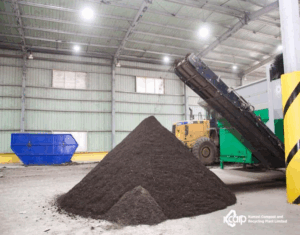
Two of Ghana’s authorized ITMO projects—focused on waste-to-compost and alternative wetting and drying for rice cultivation—are projected to reduce 2.7 million tonnes of CO2 equivalent by 2030.
This reduction is comparable to the annual carbon sequestration capacity of approximately 128.6 million mature trees.
By generating verified carbon credits, Ghana not only contributes to global mitigation efforts but also creates opportunities for green jobs, green investment, and financial sustainability within the waste management sector.
Additionally, the sale of these credits reinvests resources into further infrastructure development, ensuring the long-term viability of waste management systems.
Liquid waste management is an equally crucial component of climate resilience and public health improvement.
By rehabilitating problematic sites like Lavender Hill in Accra and converting them into modern waste treatment facilities, Ghana has made substantial progress in addressing the issue of untreated sewage.
The Accra Sewerage Systems Ghana Limited (SSGL) plant processes over 2,400 cubic meters of faecal sludge daily, converting it into safe, treated effluent and organic sludge.
This treatment process produces biochar, which can be used to enhance soil fertility and sequester carbon.
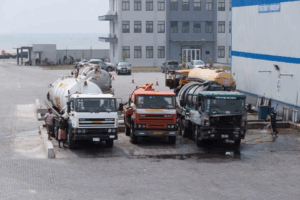
Recognizing the need for decentralized waste management solutions, similar facilities have been established in other urban areas such as Kumasi, Takoradi, and Tamale.
These plants utilize anaerobic digestion and other biological treatment processes to break down organic matter, capturing methane gas, which can be harnessed for energy generation.
As a result, these facilities reduce methane emissions, improve sanitation, and promote sustainable energy production, thereby directly contributing to Ghana’s climate mitigation efforts.
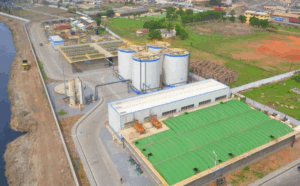
By building such facilities, Ghana is also investing in climate-resilient urban systems. Reliable waste treatment infrastructure not only mitigates the effects of climate-induced flooding but also reduces disease risks and promotes the health and well-being of urban populations.
This contributes to the resilience of cities and ensures they can better withstand future climate impacts.
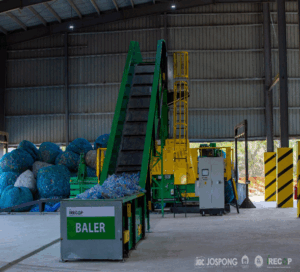
A core principle of the waste management model in Ghana is its alignment with circular economy principles. The recovery and transformation of waste into secondary materials and products reduce reliance on virgin resources and foster more sustainable production systems.
Organic waste is composted into fertilizer, plastics are recycled, and sludge is converted into biochar. This approach not only diverts waste from landfills but also closes the loop between waste generation and resource use.
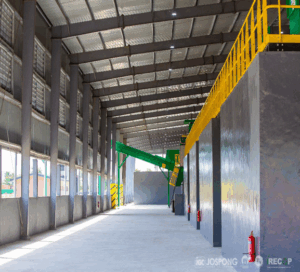
This circular model generates significant employment opportunities, particularly in the informal sector. Waste collection, sorting, and processing create thousands of direct and indirect jobs across Ghana.
These opportunities are further supported by training programs that equip local communities with the skills needed to participate in the green economy. The transition to a more sustainable, green economy is thus both inclusive and equitable, benefiting vulnerable populations while also contributing to national development.
The waste management strategies implemented in Ghana are in alignment with the country’s national development objectives and international climate commitments.
The waste management initiatives directly support the achievement of several targets outlined in Ghana’s Nationally Determined Contributions (NDCs), such as improved landfill management, waste-to-compost programs, and enhanced sanitation infrastructure.
These measures contribute to the country’s overarching goal of reducing GHG emissions and improving environmental quality.
On the global stage, Ghana’s efforts also contribute to several United Nations Sustainable Development Goals (SDGs). These include SDG 6 (Clean Water and Sanitation), SDG 11 (Sustainable Cities and Communities), SDG 12 (Responsible Consumption and Production), and SDG 13 (Climate Action).
By integrating waste management with climate mitigation and sustainable development, Ghana is making significant strides toward achieving both local and global goals for environmental sustainability and resilience.
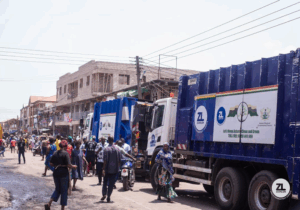
To scale and replicate successful waste management models across Africa, several key policy enablers are necessary.
These include the enforcement of mandatory waste segregation, incentives for private sector participation, regulatory frameworks for carbon credit transactions, and investments in digital infrastructure to track waste flows and emissions.
Public-private partnerships will be critical in bridging financing gaps and ensuring the long-term operational viability of waste management systems.
Digitalization offers a tremendous opportunity to improve transparency and efficiency in waste management. Innovations such as remote monitoring systems, smart waste collection technologies, and blockchain-based carbon credit registries can significantly enhance accountability and efficiency.
By integrating data into waste management planning and decision-making, these innovations can help optimize system performance and ensure the achievement of national emission reduction targets.
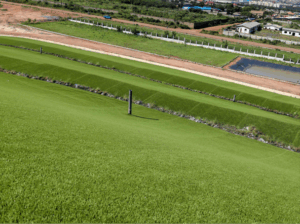
Ghana’s waste management sector is undergoing a transformation that not only addresses the immediate challenges of waste disposal and sanitation but also contributes to broader goals of climate resilience and sustainable development.
With the right mix of infrastructure, innovation, and investment, waste can be transformed from a major environmental and public health issue into a critical driver of climate action and economic growth.
The Ghanaian experience offers valuable lessons for other countries grappling with similar challenges, providing a roadmap for the development of climate-resilient and sustainable urban systems that are capable of meeting both local and global environmental goals.
As the world faces the combined crises of waste management and climate change, Ghana’s efforts present a hopeful vision for the future, where waste is not only a problem to be managed but a resource that drives positive change.

